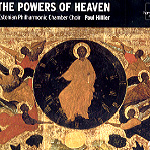There are many other collections of Orthodox music on CD, mostly from Russian choirs, the majority recorded or released since the collapse of the Soviet Union in the late 1980s. The singing is undeniably authentic, informed with native-language savvy, wide vibrato, and characteristic throaty resonance. The Bortnyansky series on Chandos that features the Sacred Concertos sung by the Russian State Symphonic Cappella is one of the premier collections, joining a host of releases by ensembles such as the Russian Patriarchate Choir (Opus 111), the Novospassky Monastery Choir (Naxos), and the Male Choir Valéry Rybin (Russian Season), each offering a varied sampling of this unique liturgical repertoire. American (Slavyanka Men’s Chorus on Harmonia Mundi) and British (Holst Singers on Hyperion) groups also offered their take on this rich and colorful music, accompanied by dozens of spottily available recordings from the Soviet Melodiya archives.
This recording offers the more clear, open-voiced Estonian Philharmonic Chamber Choir in a kind of survey that describes the style of Orthodox music, but also places it in context, both regarding its baroque Italian influences and in terms of its traditional place in the church service. We are also reminded how important singing is to the Orthodox Church, how integral it is to worship, and therefore how seriously and meaningfully the music we are hearing is regarded by congregation and choir. In the 18th century, Peter the Great’s “Westernization” of Russian culture included bringing European composers to St. Petersburg, among them the Italians Baldassare Galuppi and Giuseppe Sarti. Galuppi taught composition to Bortnyansky, and as we work our way through this beautifully sung program, we hear both the strong Italian baroque influence and the persistent and emphatic, staunchly Russian chordal style that defines most of these settings. One interesting sequence begins with Galuppi’s Italianate In the Flesh Thou Didst Fall Asleep, followed by Bortnyansky’s Concerto No. 24, drenched in Galuppi-inspired mannerisms, then back to the thick-textured, declamatory, Slavic character of Diletsky’s Praise the Name of the Lord, and on to a more Russian-flavored Bortnyansky Concerto No. 27, but with many “Italian” touches, particularly in the brief polyphonic flourishes and some of the harmonic progressions, chromatic bass movement, and melodic writing for solo singers.
Highlights include Bortnyansky’s beloved Cherubic Hymn and the closing minutes of the same composer’s Concerto No. 32 (the program’s final work), an extended fugal passage that raises the oft-discussed question regarding this composer’s true sensibilities–“Slav or Italian”? Of course, it really doesn’t matter, because anyone who hears this music will have no doubt as to its origin, its firm roots in the Slavonic language, and its deeply spiritual, church-centered heritage. For us listeners, whether of Orthodox faith or not, we certainly can enjoy the sumptuousness of the harmony, the expansive range of the voices, and the careful balance and blend maintained by Paul Hillier and his Estonian Philharmonic Chamber Choir. This is an all-around success–musically rewarding, educationally informative, and, for at least some few listeners, an involving, spiritually refreshing 70 minutes. The sound, recorded in a Tallinn church, takes on a bit of a glare in louder sections, especially where sopranos are in higher registers; otherwise, it’s just about perfect. [7/12/2003]
































